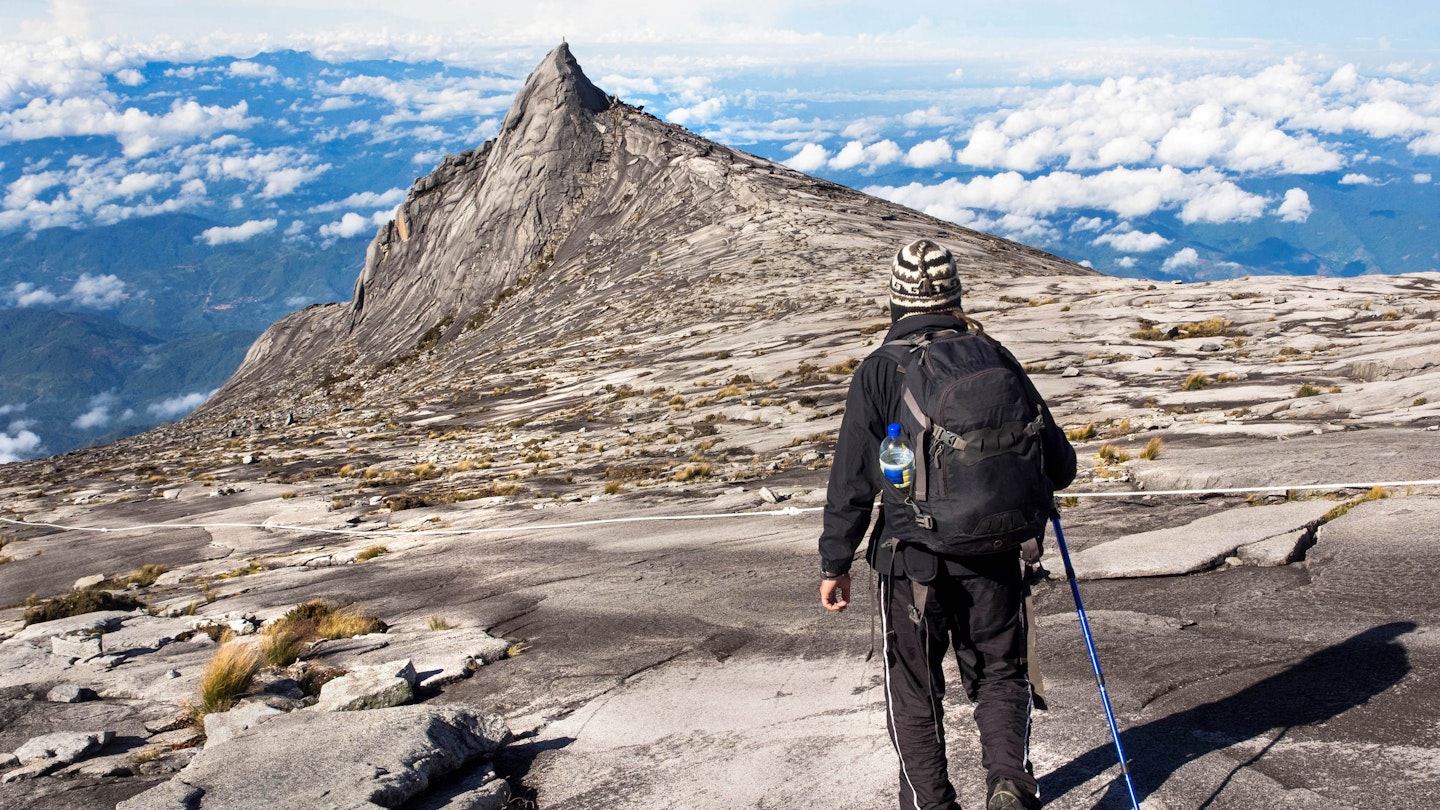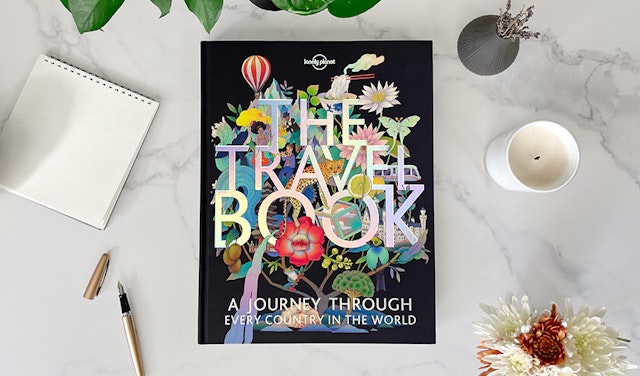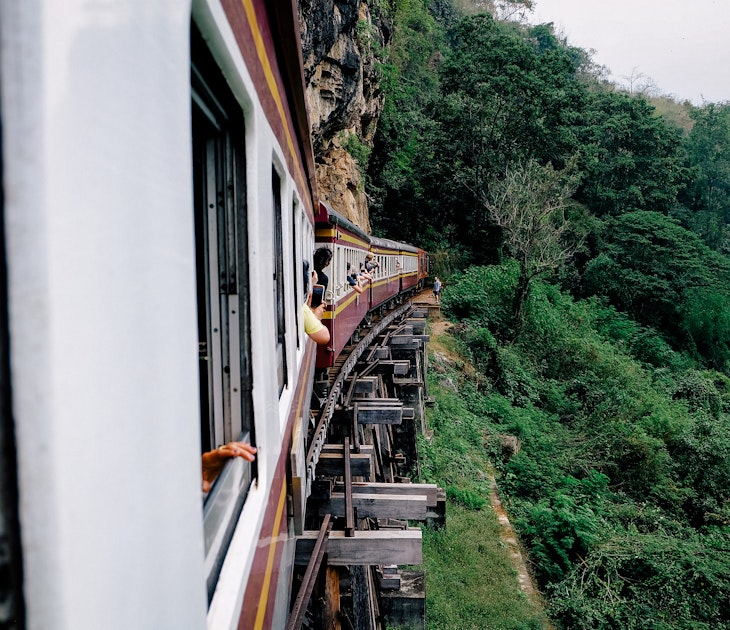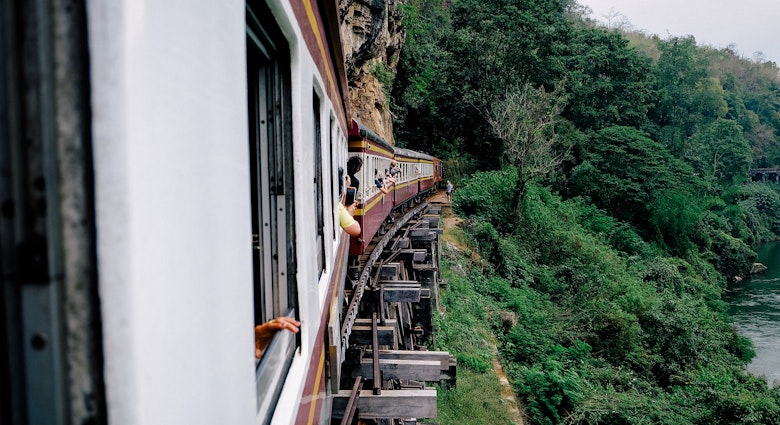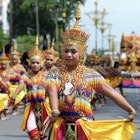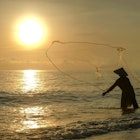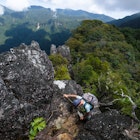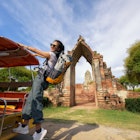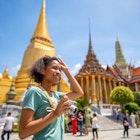Hiking in Malaysia is the perfect way to get away from the country’s teeming cities and get close to the sights, sounds and sensations of Southeast Asia’s oldest tropical rainforest. Malaysia's quintessentially tropical sea-meets-jungle terrain is best appreciated from the top of its forest-clad mountains.
The Malaysian peninsula is split in two by the 2183m (7162ft) Titiwangsa Range – the last refuge for the country's elusive population of wild tigers and Asian elephants. This hilly backbone fractures into dozens of lesser hills and peaks spilling all the way to the jungle-backed coastline, where more foliage-clad islands await.
Across the South China Sea in the Malaysian part of Borneo, more mountain ranges and limestone massifs soar above the verdant rainforests of Sabah and Sarawak, offering still more chances to get off the beaten track and test your limits.
Ready for some sweaty tropical workouts? Then lace up your hiking boots, bring plenty of water, and don’t forget to pack a pair of leech socks... Here are the 10 best hikes in Malaysia.
Mt Kinabalu, Sabah
Best high-altitude multi-day hike
8.5km (5.25 miles), 2 days, easy to moderate
Rising like a pointy fang from the jungles of northern Borneo, Mt Kinabalu is Malaysia’s highest peak, and it's a sacred site for the indigenous Kadazan-Dusun people of Sabah. The clouds that seem to perennially shroud its 4095m (13,435ft) summit – known since colonial times as Low's Peak – are believed to be formed from the resting souls of their ancestors.
Getting to the top of Low’s Peak is a physically challenging but relatively straightforward climb starting from the Timphoon Gate, beyond the flower-studded park that covers the lower slopes of the mountain. The trail winds up through mossy forests draped with orchids and clumps of pitcher plants and colorful stands of rhododendrons up to 3000m (9843ft), where hikers spend the night at one of several rest houses.
The final push for the summit involves a 2am start, timed to deliver hikers to Mt Kinabalu’s barren, wave-like tip as the sunrise explodes in myriad shades of purple above a quintessentially Malaysian awan karpet (carpet of clouds).
Penang Hill, George Town
Best urban hike
5.8km (3.6 miles) round trip, 4–6 hours, moderate
Mention Penang, and most will think of the street art, hip cafes and colonial architecture of its capital George Town, not the forested hills stretching from the town limits to the northwestern corner of the island. This natural wonderland covers 12,481 hectares of marine and terrestrial ecosystems, but most visitors see just the small section around Penang Hill – colonial Malaya’s first hill station, famed for its views over the Straits Sea and the Malaysian mainland.
Since 2021, this expanse of forest has been protected as Malaysia's third Unesco Biosphere Reserve. The most popular way to reach the 830m (2723ft) summit is on one of the world’s steepest funicular railways, but we recommend taking the scenic route via the tangle of interconnected jungle trails that snake their way up the hill from Penang Botanical Gardens. You can also start the hike from Penang City Park (aka Youth Park), or from Moongate, a circular Chinese gateway that was once the gateway to a millionaire’s estate.
The most straightforward route is the Heritage Trail, a knee-grinding staircase ascent that follows the steep tracks of the funicular railway, but it's more rewarding to take more circuitous jungle trails. There's a good chance of encounters with endangered and endemic flying lemurs, dusky leaf monkeys, hooting macaques and a staggering 144 different types of orchids.
If you have the time and stamina, after reaching the top of Penang Hill, you can continue for a further five hours through dense dipterocarp forest to the top of 725m (2378ft) Laksamana Hill, Penang’s second-highest peak. Wind up by descending to the beaches at Teluk Bahang for a well-deserved rest, before taking the Rapid Penang bus back to George Town.
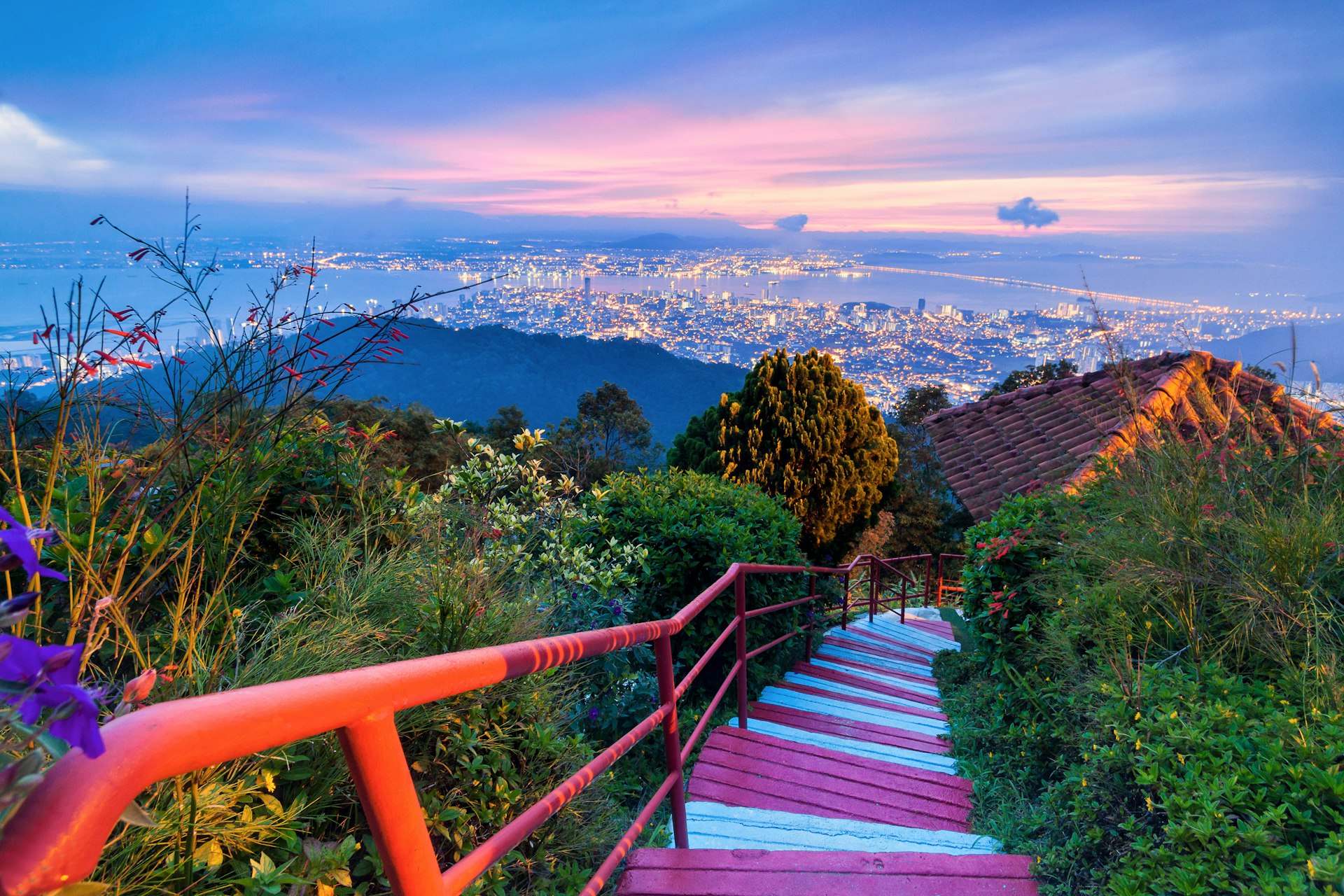
Bukit Beruang, Melaka
Best easy day hike
5km (3.1 miles) round trip, 2–3 hours, easy to moderate
Rising above the Portuguese churches, Chinese shrines and river-facing guesthouses of former Dutch enclave, Melaka, Bukit Beruang (Bear Hill) doesn't seem like a tough hike. The summit is just 116m (381ft) above sea level. But it all depends on which of the three trails to the summit you take. For the easy option, walk up via the 2.5km (1.5 mile) paved road to the telecommunications tower that dominates the hilltop.
If you want something more fun, two sweatier and more inspiring trails climb through thick walls of forest on the other side of the hill. Pick up these well-marked paths in either Taman Bunga Raya or Taman Muzzaffar Height. However you reach the top, proceed from the tower to the nearby lookout point known as "Eye on Melaka," where the historic streets loom into view.
Bukit Larut (Maxwell Hill)
Best hill station hike
20km (12 miles) round trip, 10 hours, moderate
Malaysia’s second-oldest hill station opened in 1884 at the top of 1250m (4101ft) Bukit Larut, also known as Maxwell Hill. This steep range of viridian hills stands like a protective fan above the exquisite lake town of Taiping. The route to the top of Bukit Larut wasn’t a very attractive affair until the end of 2021, when the organizing committee responsible for the yearly Malaysia Mountain Trail Festival opened three new summit paths through the jungle, as an alternative to the paved road used by jeeps.
These trails snake from the base of the mountain to the Box, one of the old colonial bungalows that pepper the atmospheric mist-covered summit of the hill, and the skeletal Telecom Tower that dominates the far side of the ridge. To make the climb, you'll need a RM10 (US$2.40) permit and a mandatory guide (RM15/US$3.60).
At 350m (1148ft), take a stop at the sloshing Ranting Waterfall before making a steep ascent through ancient dipterocarp forests that thicken as the trail climbs into the clouds. Beware of the leeches, and don’t forget to carry a raincoat, as bouts of heavy rain are almost daily occurrences in Taiping. The bungalows on the top are open for group stays, or you can camp (RM20/US$4.80) near the waterfall or at the bottom of the hill.
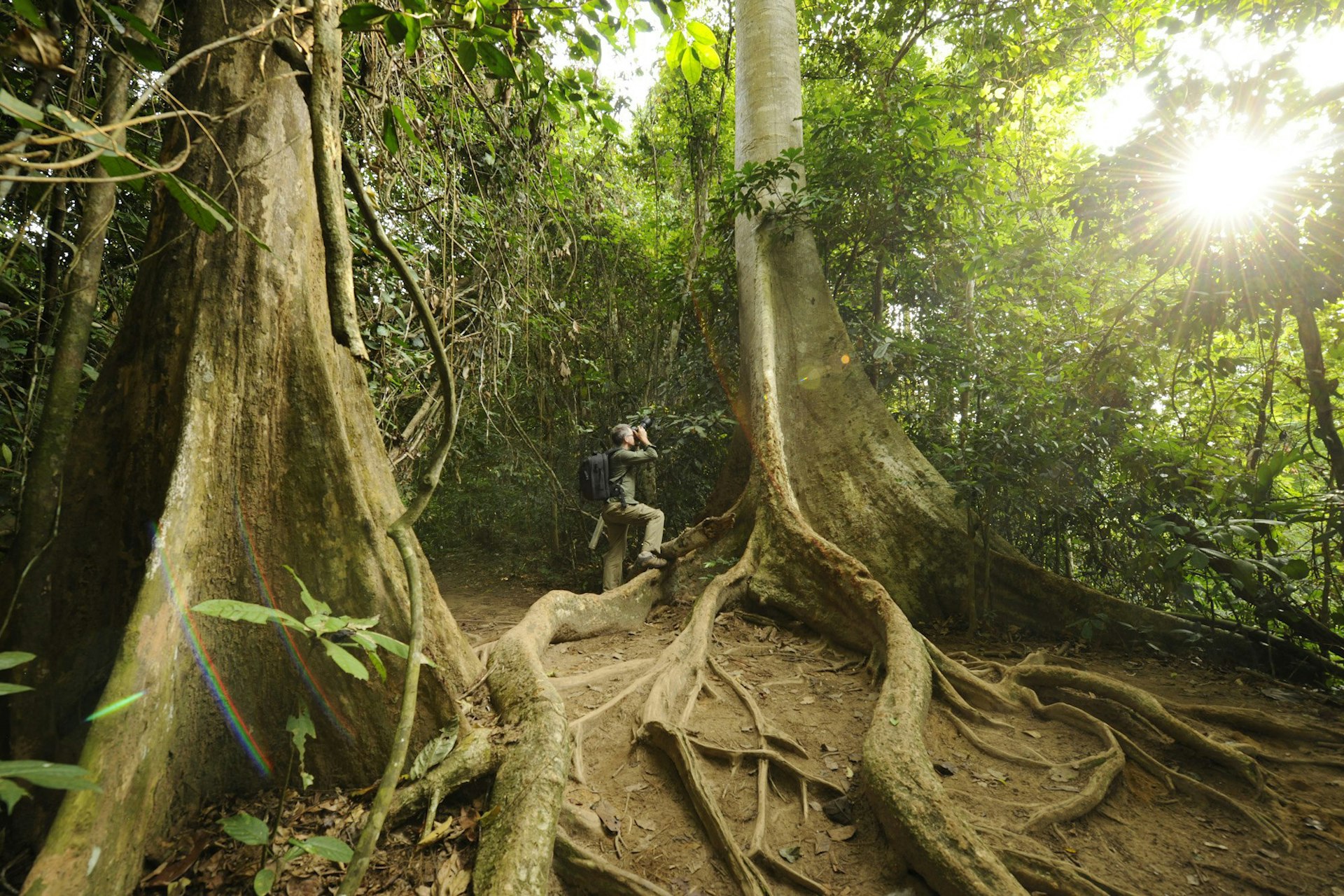
Gunung Tahan, Taman Negara National Park
Best multi-day jungle trek
55km (34 miles) round trip, 6 to 7 days, hard
The best – and toughest – way to explore the rainforest wonderland that is Taman Negara is to cross it on foot, via the 2187m (7175ft) summit of Gunung Tahan, the highest point in Peninsular Malaysia. Ringed by the world’s most ancient rainforest, this is serious wildlife-spotting country, and you'll need a guide to escort you (RM1200/US$287 for up to seven days), plus camping equipment and enough food supplies to last for a week.
The best way to tackle this adventure through elephant, tiger and tapir territory is to enter and exit from Kuala Tahan, Taman Negara’s main entry point. Alternatively, you can come in and out via Sungai Relau, the national park’s northwestern entrance near the town of Merapoh. Shorter and easier four-day, three-night treks that combine a jeep ride and a hike to Gunung Tahan’s summit also start and end here.
Broga Hill, Kuala Lumpur
Best hike near Kuala Lumpur
3.4km (2.11 miles) round trip, 90 minutes, easy
The quaint village of Broga, near Semenyih, has a 400m (1312ft) hill that attracts a steady stream of enthusiastic hikers from Kuala Lumpur. It only takes 30 to 45 minutes to reach the treeless hilltop with its undulating sea of lalang grass, but the climb is steep in places and the walk will get your heart pumping.
There are stunning views over the Kuala Lumpur skyline and the surrounding Klang valley from the grassy plateau, but the place can get packed, especially on weekends. It’s best to climb on a weekday and at sunrise to beat the crowds. Aim to start by 6:30am to catch the sunrise at around 7:15am. If you have any energy left, a path leads from the summit to 675m (2215ft) Gunung Tok Wan, a more challenging hike through jungle scenery (but without the valley views).
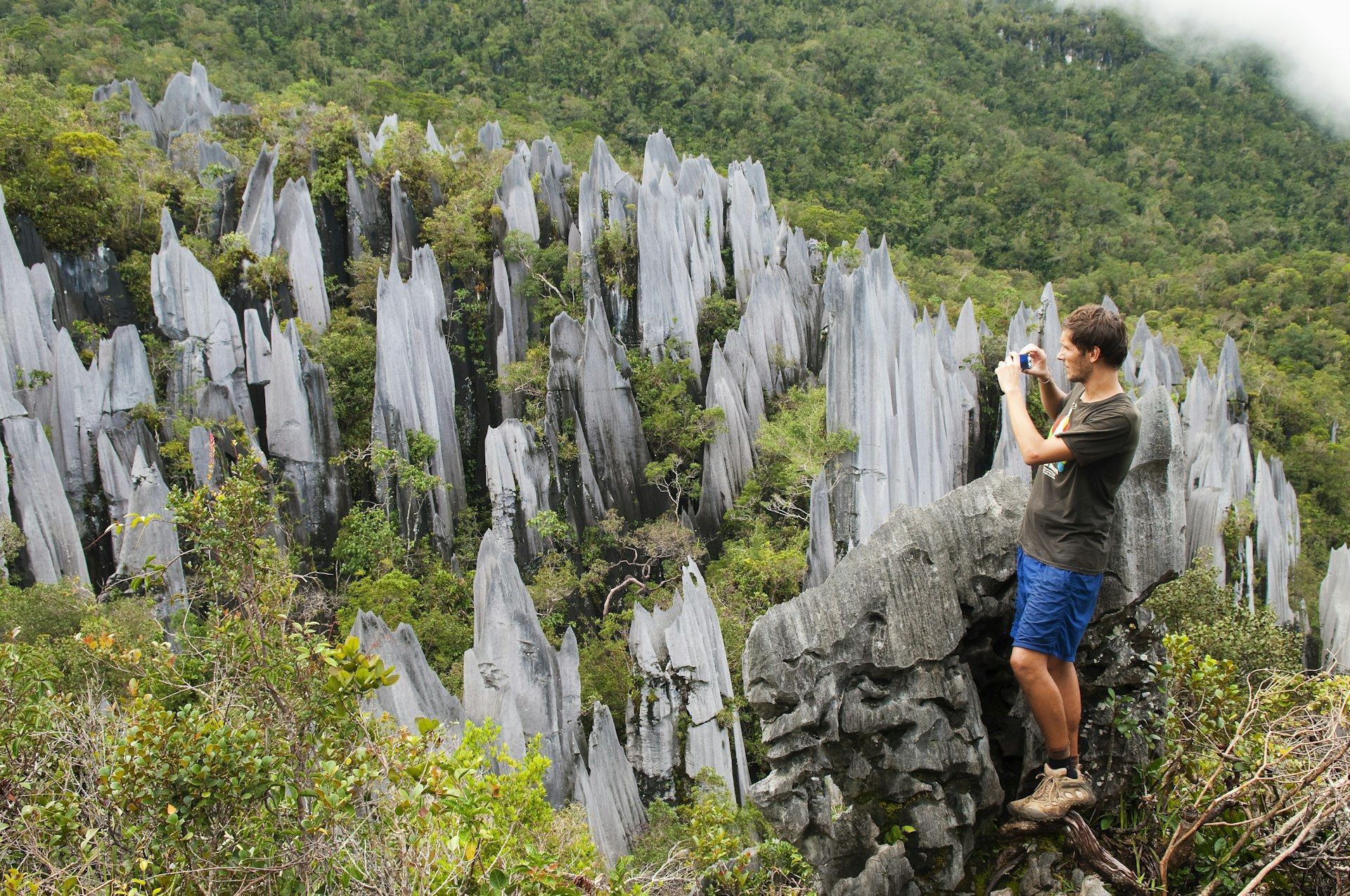
The Pinnacles, Gunung Mulu National Park
Best adventure hike
4.8 km (2.9 miles) round trip, 4–5 hours, hard
Tucked into the densely-forested interior of northern Sarawak, the giant caves and turbid streams of Gunung Mulu National Park thoroughly deserve their status as a Unesco World Heritage Site. One of the highlights of a visit to this stunning reserve is the tough hike up 1750m (5740ft) Gunung Api to marvel at the Pinnacles – a series of razor-sharp limestone outcrops that look like petrified flames, some rising 50m (164ft) from the jungle floor.
The first stage involves a 9km (5.6 mile) slog through a dense, flat area of dipterocarp forest to reach Camp 5. From this basic riverside shelter, the hike proper will start the next day at the crack of dawn. Hikers who fail to reach the upper slopes quickly enough may be turned back by guides, as they're not considered fit enough to carry on with the extreme final climb to the Pinnacles viewpoint at 1200m (3937ft). The vertigo-inducing final stretch, via a series of impossibly-perched metallic staircases, will test your calves and your nerves.
Panorama Hill, Pahang
Best hike for sunrise views
4.8km (3 miles) round trip, 1–2 hours, easy
The Sungai Lembing river is a well-known destination for eco-tourism in southeastern Pahang state, and Panorama Hill is its main drawcard. One of the main reasons people flock to this 271m (889ft) viewpoint is its perfect location – the summit is only 150m (492ft) away from the main road, via a well-manned flight of stairs that can be climbed in just half an hour.
To beat the crowds, start hiking as early as 6am to reach the ridge summit by 7am, as the sunrise paints the clouds in tones of purple before the mists dissolve to reveal the Sungai Lembing valley and the karst outcrop containing the Buddhist Charas cave.

Batu Punggol
Best offbeat hike
244m (800ft) round trip, 2 hours, hard
Sacred to the Murut people of southwestern Sabah, this rocky outcrop is not for acrophobics. Batu Punggol is only accessible by a canoe ride along a jungle river, followed by a strenuous hike through untamed rainforest to reach the base of the crag. The reason for coming here is to attempt the scary, two-hour ascent of this lonesome limestone pinnacle, which sticks up like a rocky thumb above a carpet of hooting jungle.
Batu Punggol is best reached from the Orou Sapulot ecotourism project with the help of local guides, who can steer you up the tricky last stretch of this almost vertical ascent over bare, sharp rocks. It’s certainly a testing workout, but the views from the top stretch as far as Kalimantan in Indonesia and are well worth the adrenaline and sweat it takes to reach the top.
Tawau Hills Park
Best hike for wildlife-spotting
26km (16 miles) round trip, two days and one night, easy to moderate
Offbeat Tawau, Sabah's southern frontier city, has grown in status as a hub for natural adventures and wildlife-spotting in recent years. The climb to the volcanic summit of 1240m (4068ft) Mt Lucia starts right from the headquarters of Tawau Hills Park, and you'll see rare hornbills, supersized jungle insects and Bornean frogs along the trails.
Reaching the top of Mt Lucia involves a day-long slog up a well-marked trail, following a forested mountain ridge strewn with large trees. At the summit, hikers can stay overnight with local park rangers in a rustic but comfortable chalet that's a great base for night hikes. Look out for Malay civets, Sambar deer and other night critters.
You may be stirred from your slumbers by the whoop of a gibbon, or the echoing coo of the rare helmeted hornbill, before you make a call on whether to return to the park headquarters or stay longer and continue hiking for another 4km (2.5 miles) to reach 1310m (4298ft) Mt Magdalena.
Tips for hiking in Malaysia
When it comes to the rainforest, you don’t play play (mess around), as they say in these parts. Never set out on a hike without letting someone know where you are going – you really don't want to get lost with nobody looking for you. Even better, hire a guide - they're recommended for a reason, especially in Borneo.
Here are some more essential tips.
- Always carry plenty of drinking water (or a water filter to purify water as you go). More popular trails may have rest stops for hikers where you can find water, but carry plenty of your own just in case.
- Trails are generally maintained by locals rather than by the authorities, so don’t expect clear signage and comprehensive facilities. Make sure you are clear on the route before you set off, or take a local guide.
- Always carry a fully charged smartphone (and ideally a backup power bank) and load it with offline GPS applications such as Maps.me, Gaia GPS or Relive, which all have excellent mapping covering the most popular trails in Malaysia.
- Never set off on your own. At ground level, the jungle looks like a wall of continuous green and it's very easy to miss a turn and get lost. Plenty of local hikers head out to the trails on any given day, and there are several Facebook hiking groups where you can find friendly trail mates.
You may also like:
The 15 best things to do in Malaysia: Mountains, marine life, and amazing apes
12 best things you have to do in Singapore
'Ghosts are a big part of life in Malaysia': healing one year after losing my parents to COVID

